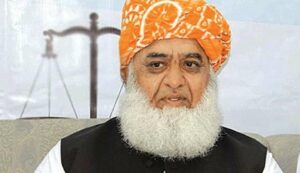Pak: JUI-F chief Maulana Fazlur Rehman has not yet decided on starting a long march to Islamabad
Islamabad: The head of the Jamiat Ulema-e-Islam-Fazl (JUI-F), Maulana Fazlur Rehman, said Friday that his group has not yet decided whether to participate in a lengthy march to Islamabad to express disapproval of the postponement of the presidential assent to the Societies Registration (Amendment) Act 2024, which concerns seminaries, according to Dawn.

The statement coincides with mounting resentment among his party’s members, as a number of officials have threatened protests in an effort to get the law passed.
Prime Minister Shehbaz Sharif has personally stepped in to address the issue. The prime minister promised Maulana Fazl over the phone that the government would move quickly to approve the contentious bill. Days before Maulana Fazl’s scheduled gathering in Peshawar, where he is anticipated to make an announcement on his next course of action in the event that the law is not approved by December 7, this guarantee was given.
During a visit to Swabi, where he paid his respects to the late JUI-Nazriati chairman Maulana Khalil Ahmad Mukhlis, Maulana Fazl emphasized the agreement struck on the seminary law before the general elections.
“Once we came back to talking, we had five hours of normal talks with PPP Chairman Bilawal Bhutto-Zardari in attendance. Consensus was reached on everything. He said, “So, where have these objections come from now?”
The head of JUI-F blasted the federal administration for its delay tactics, especially after the measure was previously approved by parliament.
“We find the federal government’s delaying tactics over the passage of the Madressah bill intolerable. He expressed his anger at the sluggish development and said, “We want its approval as soon as possible.”
In addition to pointing out that the governing coalition originally backed the law, Maulana Fazl emphasized how crucial it is for managing the nation’s religious institutions. However, he bemoaned the fact that the same coalition was now impeding its passage, describing this as a provocative and regrettable development.
“The government is consciously leading the people towards protests,” he said.
On October 22, the seminary law was sent to the president for his approval after being adopted by the National Assembly on October 21 and the Senate on October 20. On October 29, however, President Asif Ali Zardari returned the bill with concerns before his trip to the United Arab Emirates.
According to reports, the president’s major argument was that, in accordance with the 18th Amendment, seminaries are under provincial authority and that the federal government may only enact laws pertaining to these subjects with the approval of at least two provincial legislatures.
Aslam Ghauri, a spokesman for the JUI-F, clarified that Maulana Fazl had informed Prime Minister Sharif of the religious schools’ concerns, especially with reference to President Zardari’s reservations.
“The administration should refrain from making this agreed-upon law contentious, the PM was told. “We will not permit any harm to the freedom and liberty of religious seminaries because we have a principled stance,” Ghauri said.
Prime Minister Sharif promised Maulana Fazl that the measure will be approved at a combined parliamentary session on December 13, according to JUI-F sources. According to Dawn, PPP Chairman Bilawal Bhutto-Zardari also allegedly pledged at a meeting on December 4 to consult with the president in order to guarantee the bill’s passage in the days ahead.
The goal of the bill is to return seminary registration to the deputy commissioner’s office, as it was done before 2019. Following discussions with seminary officials, seminary registrations were moved to education departments under the PTI-led administration. The revised law suggests bringing back the previous framework.
Despite this guarantee, Maulana Fazl warned that the JUI-F’s patience was running low and alluded to perhaps using more drastic steps to solve the delays. “There should be no confusion regarding the madressah bill,” he said, restating the agreement that had been made with the administration.
Speaking on Khyber Pakhtunkhwa’s larger political and security concerns, Maulana Fazl said he was disappointed with the provincial government’s handling of the situation. According to Dawn, he criticized the worsening state of law and order, saying that the people were suffering because the government was unable to protect them.
The KP governor’s recent effort to call a multi-party conference was also questioned by him, who said that the governor lacked the power to unite the parties involved. He said, “The governor is not in a position to gather all stakeholders on a single platform,” and that the governor’s rule was not a workable long-term option.
Internal JUI-F discussions on how to deal with the bill’s passing delays are ongoing as the party’s gathering in Peshawar approaches. Maulana Fazl has said unequivocally that his party expects the government to fulfill its obligations, stressing that any more postponements may compel the JUI-F to intensify its reaction.





